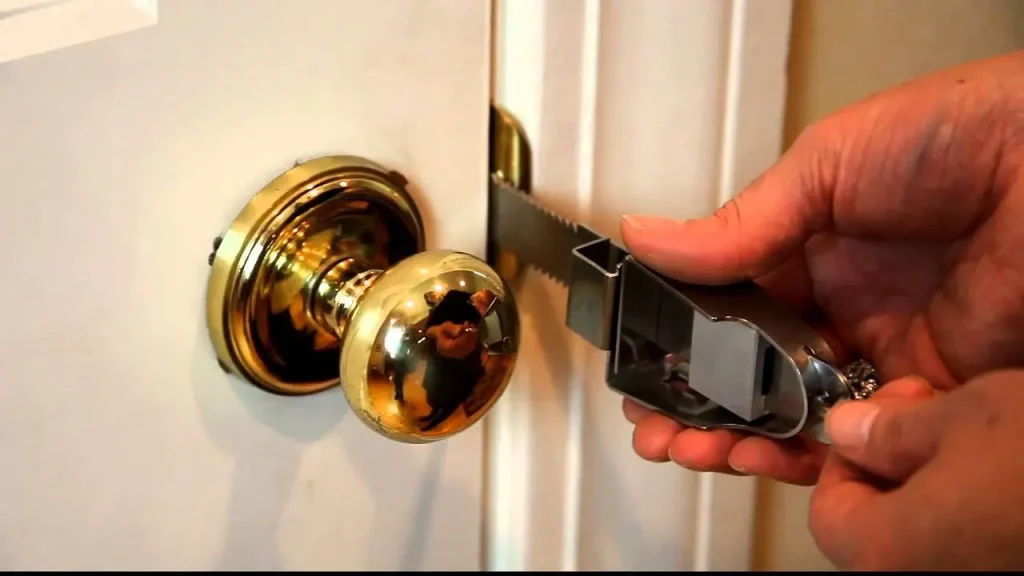
5 Best Door Locks for Dementia Patients? + Pros & Cons
What are best door locks for dementia patients? Elderly with Alzheimer’s need love, affection and help more than anyone else. Alzheimer’s disease is a type of brain dysfunction that over time affects people’s mental abilities and takes their control out of the patient’s hands. Usually, this disease exists in 2 to 5 percent of the elderly people in our society. Loss of ability to recognize time, depression, loss of ability to speak, isolation, etc. are among the symptoms of this disease.
Over time and with the progress of the disease, these people will become forgetful and even face many problems with activities of daily living (ADL) such as eating, dressing and general hygiene. These problems cause a change in the patient’s behavior and make caring for them very difficult and exhausting for the families in a way that sometimes confuses the families.
One of the main concerns for dementia patients is their safety. These patients may be at risk of becoming lost, disoriented, or injured due to forgetfulness, confusion, or impaired judgment. One of the important ways to keep these patients safe is to use appropriate equipment at home. By choosing the right door locks, you can prevent careless entry and exit of patients and avoid accidents.
In this article from humanhealthmag, we are going to review the best door locks for dementia patients. We will examine the different types of locks and outline the advantages and disadvantages of each. Also, we will discuss important factors to consider when choosing the right lock.
Creating a Safe and Calm Environment for Patients with Dementia
How do you secure doors for dementia patients? What role do best door locks for dementia patients play to make the home environment safer? Providing comfort and creating a safe environment is the first and most important thing that families should consider in caring for Alzheimer’s patients.
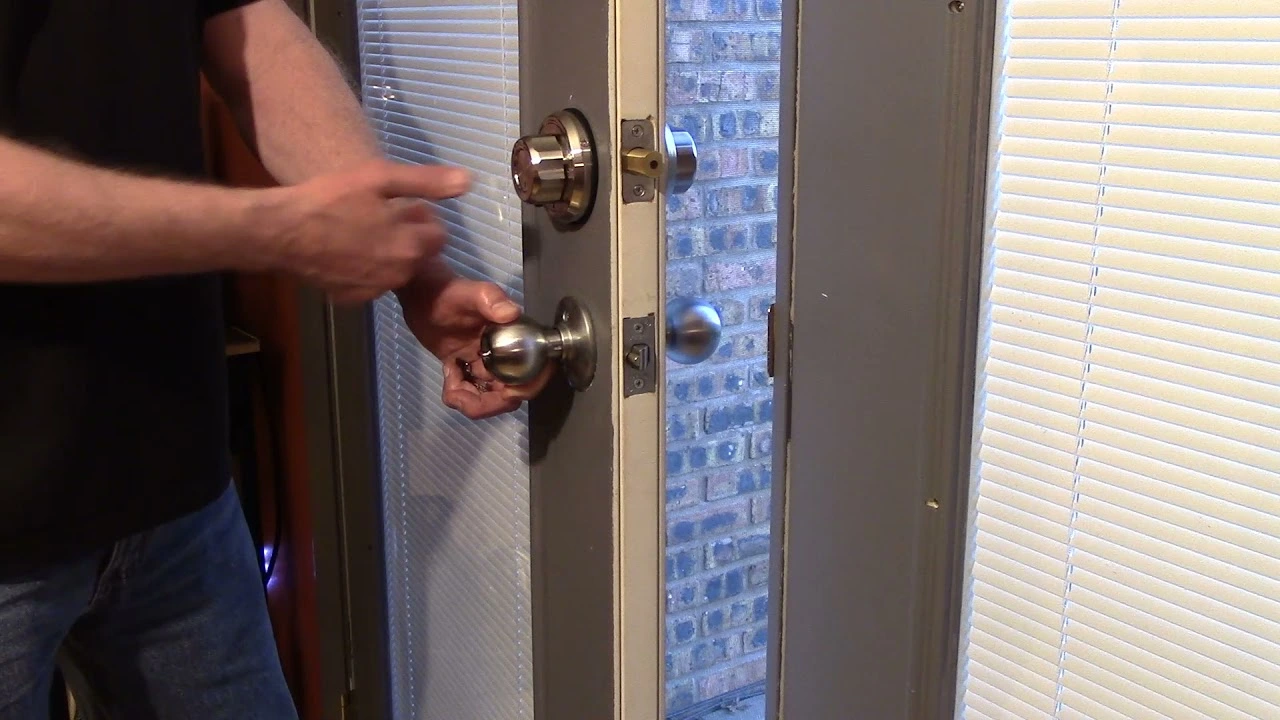
But remember that keeping them safe does not mean undermining their independence. Since these people may have problems maintaining coordination and balance due to the use of drugs, it is necessary to keep sharp and dangerous objects away from them and to put appropriate locks and protection on the doors and windows.
What locks keep dementia patients from wandering? Today, with technological advances and with the help of tracker technology, concerned families can continuously monitor their behavior and work without depriving them of the authority and independence of their Alzheimer’s elderly. Also, using a person tracker can make life sweeter for the elderly who are struggling with Alzheimer’s, madness and dementia. In fact, using a person tracker is an effective step to protect these family members. Because families can find out about the condition and location of their elderly person with Alzheimer’s at any moment of time, and if necessary, help them personally or in a suitable way.
But in this article, we are not going to talk about the best trackers for caring for elderly people with dementia. We are going to check out the best door locks for dementia patients. Our goal is to help families and caregivers provide a safe and comfortable environment for their loved ones by introducing appropriate options.
Features of Suitable Door Locks for Dementia Patients
Dementia disease, especially Alzheimer’s, leads to serious elderly mood disorders and cognitive abilities, which can cause problems in the safety and security of patients. One of the most important challenges is managing access and preventing unwanted patients from leaving their safe environment. In this regard, choosing the right door locks can play a very important role in maintaining the safety and comfort of dementia patients.
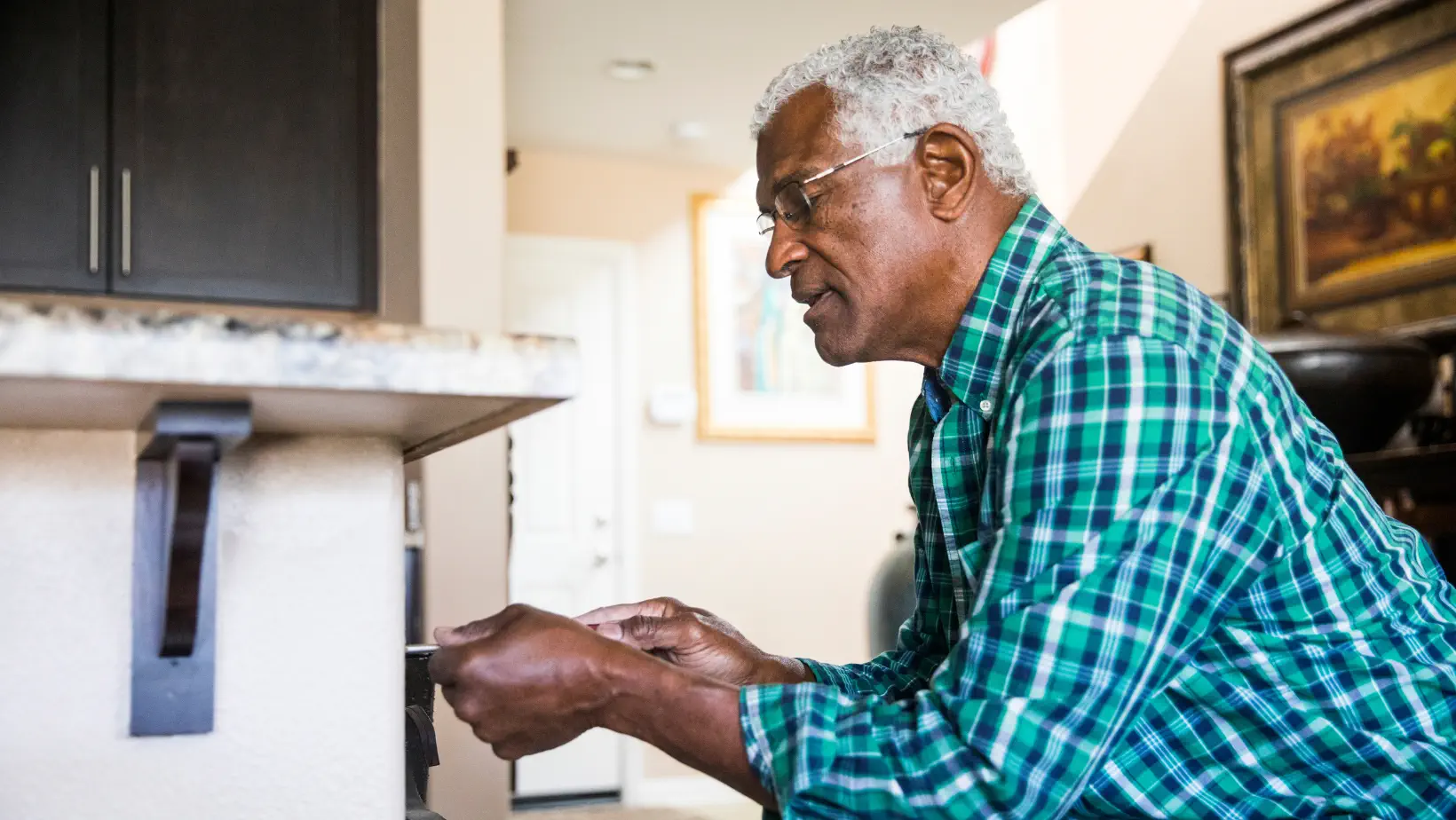
But what features should Best Door Locks for Dementia Patients have in order to be classified among these locks?
- Locks that are easy to use and do not require long and complex passwords
- Locking buttons and levers should be easy to recognize and use.
- Using simple and clear symbols to show the locked and unlocked status of the door can be very helpful.
- The lock should be such that the patient cannot easily open the door and leave the house.
- The lock must be made of high-quality material and be resistant to breaking.
- In an emergency, caregivers and family should be able to reach the patient quickly.
- If electronic locks are used, they must be resistant to electromagnetic interference.
- Locks that allow locking from the outside (these types of locks usually have special mechanisms that cannot be opened from the inside if needed and can only be used from the outside)
- Locks with anti-tamper features and high-quality locks
- Locks that can be locked from the outside
Note: The lock must be installed at a height that the patient can easily access. To increase security, auxiliary locks such as chains or bars can be used.
5 Best Door Locks for Dementia Patients
It is very important to choose the right lock for the door of the home of dementia patients. These locks should protect the security of the home as well as prevent the patient from getting lost or injured. Here are some of the best door locks options for dementia patients along with their pros and cons:
1. Best Door Locks for Dementia Patients: Smart Locks
Advantages:
- Remote control: it is possible to lock and unlock the door remotely using a mobile phone or other smart device.
- Password: It is possible to use a one-time or permanent password for different people.
- Access history: It is possible to view the history of people who have entered or exited.
Disadvantages:
- High cost: They are more expensive than regular locks.
- Power or battery required: They may not work if there is a power outage or the battery runs out.
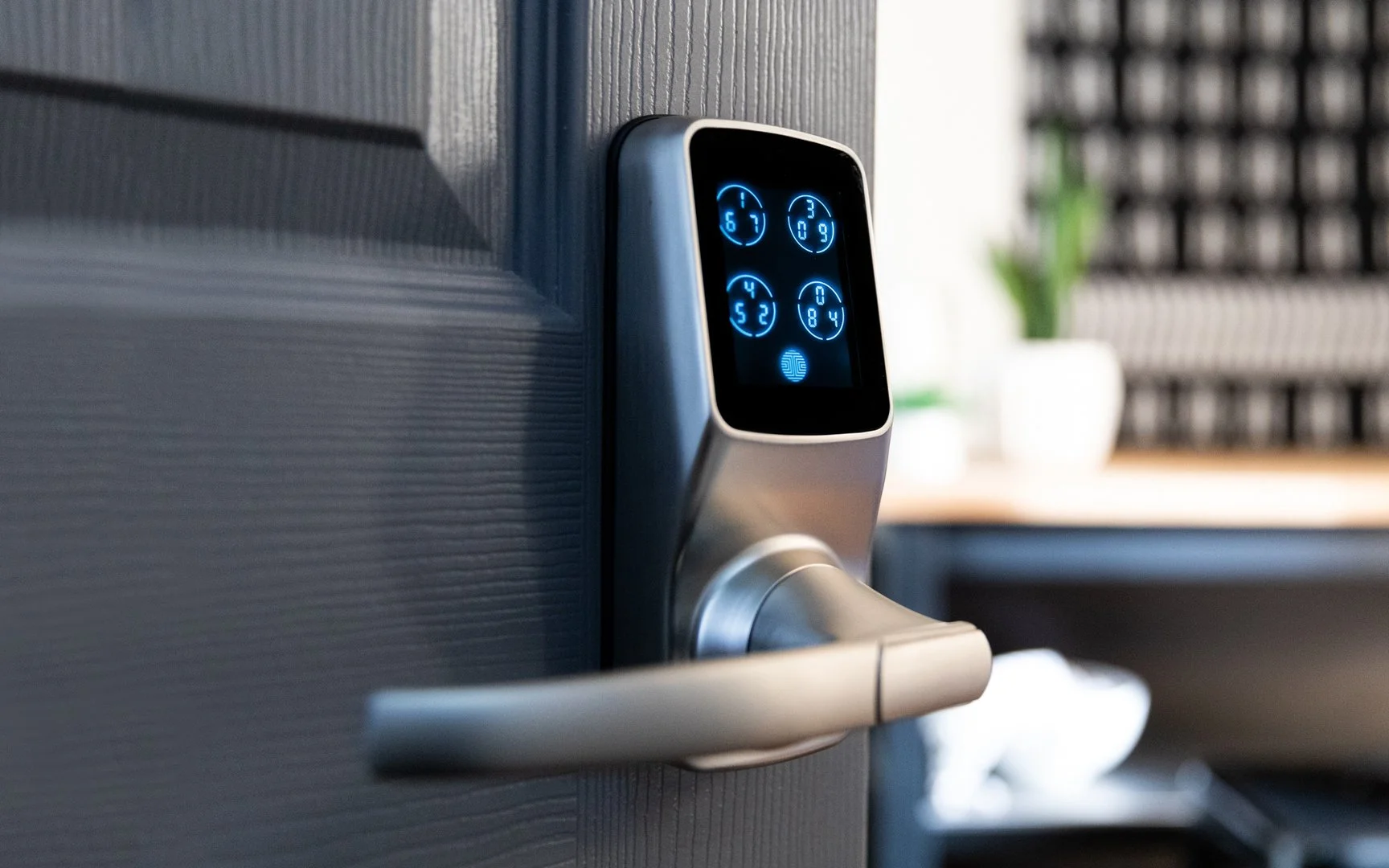
2. Best Door Locks for Dementia Patients: Password Locks (Combination Locks)
Advantages:
- Simplicity: They are easy to use and do not require keys.
- Security: If you forget the password, it is difficult for other people to log in.
- Cost-effective: They are cheaper than smart locks.
Disadvantages:
- Forgetting the password: the patient may forget the password and get stuck outside the house.
- Limitation on the number of passwords: usually the number of configurable passwords is limited.
3. Best Door Locks for Dementia Patients: Magnetic Locks
Advantages:
- Easy operation: by bringing a card or magnetic key close to the lock, the door opens.
- High security: if there is no card or key, the door remains locked.
Disadvantages:
- High cost: They are more expensive than regular locks.
- Requirement of power supply: they need electricity or battery to function.
4. Best Door Locks for Dementia Patients: Electronic Locks with Card or Key
Advantages:
- High security: they can be opened using a card or a special key.
- Access control: it is possible to set access for different people.
Disadvantages:
- Lost card or key: If the card or key is lost, a new card or key must be obtained.
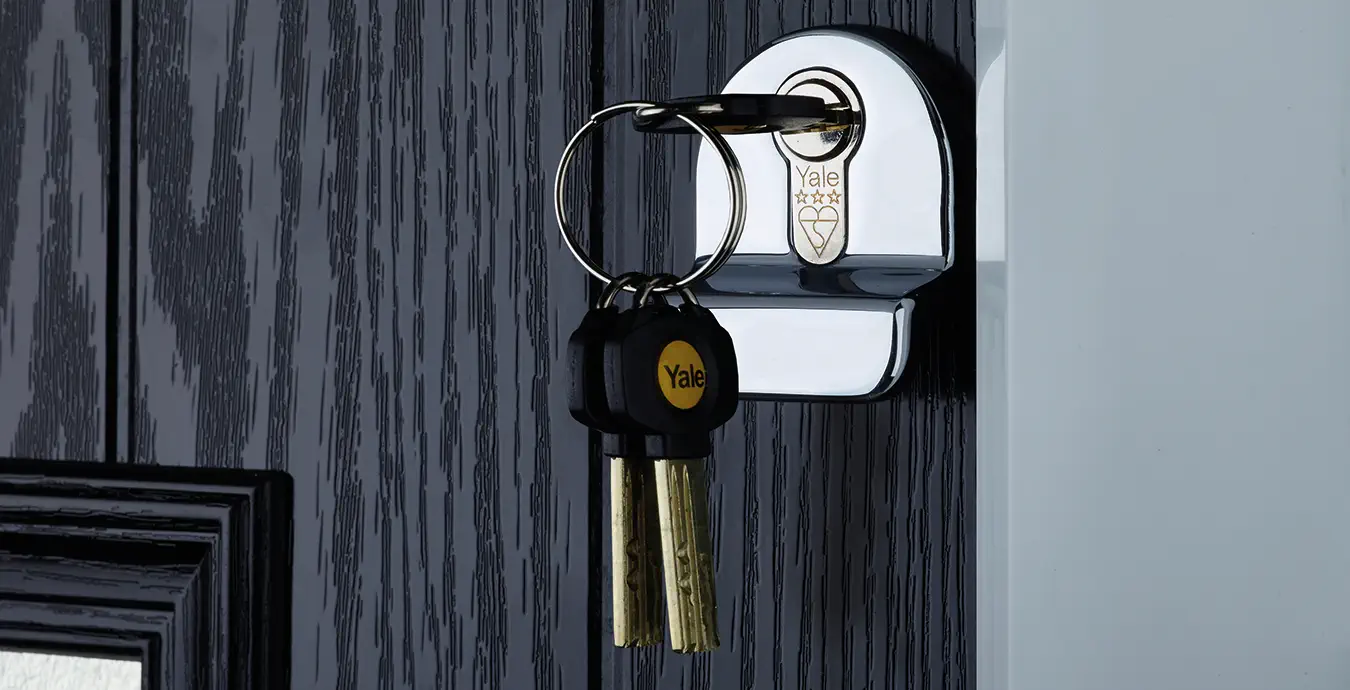
5. Best Door Locks for Dementia Patients: Mechanical Locks with Key
Advantages:
- Simplicity: They are very simple to use.
- Reasonable cost: They are the cheapest type of lock.
Disadvantages:
- Lost key: If the key is lost, the lock must be replaced.
- Low security: They are less secure than other types of locks.
Entertainment for Dementia Patients
Now that we are familiar with the best door locks for dementia patients, we must say that although there is no definitive cure for dementia and Alzheimer’s disease. You can prevent the premature aging of the brain and the loss of gray cells by taking the help of mental games and entertainment for dementia patients. As the brain cells age, brain function will gradually stop and dementia will occur. The best way to prevent this happening is to keep the brain active. Dementia friendly easy coloring pages for dementia patients are designed to be easy and enjoyable for people with dementia.
Solving the Puzzle
Puzzles and gesg brain teaser are two of the effective entertainments that can be used to strengthen the memory of elderly people with Alzheimer’s disease. For this purpose, it is better to start the puzzle game with simple pieces and gradually increase the number of pieces. First, let the senior look at the completed picture and then ask him to complete the picture by putting the puzzle pieces together.
The list Repetition Game
The list repetition game is among other entertainments that help to improve memory and treat dementia elderly. Most of the people have experienced this game and it can be considered as one of the entertainments of elderly people with dementia, which can help strengthen their memory. It is a group game that 2 to 4 people can participate in. The first player starts the game by saying a word, and then the next player, while repeating the first player’s word, must also add a new word. In this way, a list of words is created, and each player must say this list and add another word to it. This game can be considered an effective and exciting entertainment for Alzheimer’s seniors, which strengthens their concentration and memory. Do you know what happens if you are accused of elder abuse.
Concluding Remarks
In conclusion, choosing the best door locks for dementia patients is a critical issue that can directly affect their quality of life and safety. The right locks not only prevent unwanted exits and potential accidents, but also provide peace of mind to families and caregivers. By considering features such as ease of use, high security, and the ability to prevent unauthorized access, it is possible to provide a safe and secure environment for dementia patients.

FAQs
Why Is It Important to Choose the Right Door Locks for Dementia Patients?
Choosing the right & best door locks for dementia patients is very important because these patients often have memory problems and confusion that may lead them to leave the house unintentionally or enter unsafe places. Appropriate locks can prevent these risks and help caregivers and family provide a safe and controllable environment for the patient. This not only prevents unwanted incidents, but also gives peace of mind to families.
What Features to Look for in a Suitable and Best Door Locks for Dementia Patients?
In choosing the best door locks for dementia patients, one should pay attention to features such as ease of use, ability to be locked from the outside, and resistance to manipulation. Locks should be designed so that the patient cannot easily open them, but the caregivers can easily access them.
Are Digital Locks Suitable for Dementia Patients?
Digital locks can be a good option for dementia patients, especially if they have the ability to set a code or biometric identification. These locks allow caregivers and family to easily control access to doors and prevent unwanted entry or exit. However, it is important that digital locks are chosen in such a way that they are easy to operate and can be opened quickly in an emergency.
